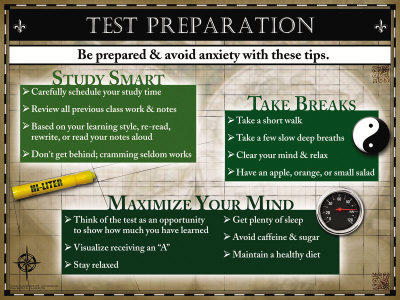How to Get Accepted to College

Getting accepted to college these days is a task which requires a great deal of preparation and commitment, but the benefits of a college degree are equally great. You should be prepared to put in a considerable amount of time and effort in order to reap the rewards of getting into your chosen school on the first try. Following these steps, you should be in good shape compared to most of the applicants trying to get into the same college.
Ideally, you should begin preparation for college acceptance no later than middle school; however, it's never too late to try to do some of these tasks to improve your chances of acceptance.


- Start by improving your grades. Get a tutor, ask your teacher for help, or whatever you have to do. You want to have as good grades as possible. Get help on test-taking skills, time management, study skills, and anything else you need help with.
- After your grades are good, you'll need to start doing volunteer work. Most colleges these days are looking for students who will give back to the community. You want to show a regular record of volunteering, so think about how and where you'll want to spend lots of time.
- If you don't already have one, make a Facebook profile, a LinkedIn profile, and profiles of whatever other social media sites are around. Because it's likely that someone else has the same name, you want to make sure your profile is distinguished from everyone else's, because otherwise recruiters (and later, employers) could assume a page is yours, when it belongs to someone with the same name. Be very careful what you put on your profile--never put anything that could ever be embarrassing--photos, text, files, and be very careful with whom you associate. The fact is, college recruiters and employers look very carefully at everything that you ever put online. If you have already put anything embarrassing online, remove it at once! Don't delay this step. Before you post anything, ask yourself: Would this post be more likely to get me a good job or get into college? If not, don't post it! Above all, stay away from political posts; you don't know the politics of unknown persons and there's no benefit to having politics on your social media.
- Choose your extracurricular activities wisely. Colleges are not looking for people who play video games unless they are programming or computer design majors. Pick something you enjoy, because you'll be doing it a lot, but do some research to discover what will be acceptable to colleges. An unusual activity (medieval history) will be remembered better than a common one. One that colleges really look for is classical music and that improves your chances greatly.
- Look for opportunities to expand your skills and knowledge. Whether it's working part-time in a parent's or friend's business, starting your own, working as an unpaid intern, or finding special summer programs, don't hesitate to jump in and improve yourself!
- Begin asking your teachers about colleges and their experiences. Also ask your parents, older friends who have attended college, and take note of where they went and what their experience was. Now is the time to begin networking as if for a business; find people who have connections that can help you get into a particular school
- Narrow down your choice of major, as not all schools are equal at every major. One great book to help you is Richard Bolles' "What Color is Your Parachute?" which you can find in the library.
- Research colleges to find the schools best suited for your major. Check online for their admissions requirements. Don't forget to research how much it costs and how you will be able to pay for it. Also find out their time limits for applications and what entrance examinations they require. If you can find someone who has attended one of those colleges, ask to interview them about their experiences.
- Study for the entrance examinations (SAT, ACT). There are plenty of books and websites to help you prepare for them.
- Schedule a test time for the entrance examination. Make sure you understand the rules for the examination thoroughly. Don't forget to pay the fee.
- Show up for the entrance examination a little ahead of time, and make sure you won't be distracted by needing a drink of water, having to use the restroom, etc. Bring extra pencils and erasers.
- Ask your teachers, employers, volunteer work supervisors and anyone else important to you for a letter of recommendation. Ask them to seal the envelope and sign their name so that it crosses both the flap and the back (to ensure the recommendation has not been tampered with afterwards).
- Write colleges well in advance of the application deadlines and begin filling out college forms. Allow at least a week to fill out each college application, extra time if you need to write an essay. Photocopy each form and fill out the copy first, to avoid making errors on the actual form. When you're satisfied, begin filling out the forms. Keep a copy for yourself.
- Mail off each form at least two weeks in advance of the application deadline. Send it certified mail, return receipt requested so that you know the college has received the admissions form. If you do not receive the receipt in ten days, have an extra copy delivered by a delivery service.
- If your college requires an interview, ask your parents, teachers, and their friends to help you practice. You want to be extra prepared. If the program you're applying to requires an audition, prepare the material at least two months in advance. Keep practicing your material every day because at the audition you are likely to be nervous and distracted, so the more prepared you are, the better the audition will go.
- Colleges will begin to respond after the application deadline with acceptance or rejection letters; some will ask you to schedule an audition or interview, and some might just assign you an interview or audition time and date. If you have to interview or audition, plan to arrive the night before and be well-rested. Find a hotel nearby the college and check out the area in advance to find a nearby restaurant, drugstore, etc. Take an extra interview or audition outfit and wear comfortable shoes because you'll probably have to walk a lot. Take a notebook or pad and pen and bring it to the interview.
- Do not apply to "safe" schools (ones where you know you will be accepted) unless you really want to go there. They can be a huge waste of time and money if the school is not right for you. If you don't get accepted to your choice of schools, don't lose heart! Enroll in a nearby community college, get good grades, knock some of those required courses out of the way at a much lower price, and prove to the people at the school you want that you can make good grades and reflect well on the college, then try again. CLEP exams can be a great way to eliminate a lot of the required courses at very little cost.
- If you've enrolled in a community college, use this time to continue to network and see if you can find someone who knows someone in the administration of your desired college. Network with that person, and have the person at your desired college help you with your application for the next year.

Other Helpful Advice
- The more time you have to prepare in advance, the better your chances will be.
- Apply to more than one school at a time.
- If you need help financing your college education, check out the college's scholarships, work/study, as well as grants and loans. Taking a part-time job during the summer and saving will help a lot, too. You can also check out upromise and have relatives or friends of the family start a 529 fund for you, too. Another good resource is local philanthropic societies (Rotary, Lions Club, fraternal organizations) and non-profits.
- Music instruction greatly improves your chances not only of being accepted into a college, but can enhance your SAT scores, too.
- It's a real temptation to procrastinate. Don't do it! The choices you make will affect you for the rest of your life, so try to get into the best college possible.
- Remove any embarrassing or offensive online messages, files, etc. at once. Web pages get archived and the college recruiters know how to access these archives. If you have removed the offending items earlier rather than later, that will show the recruiters you have realized the error of your ways.





